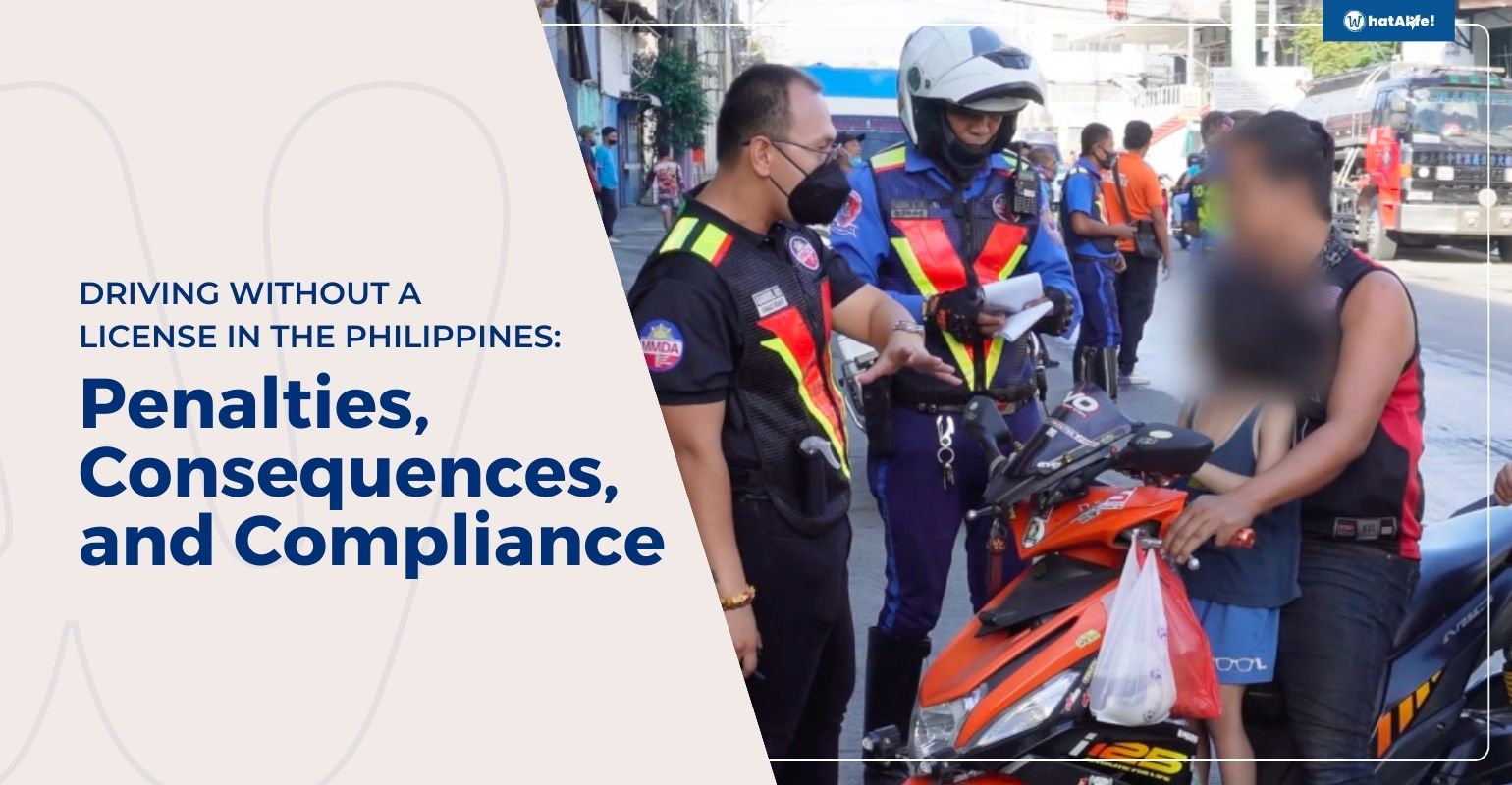Driving is a privilege that comes with a significant responsibility—operating a vehicle safely and within the confines of the law. In the Philippines, like in many other countries, a driver’s license is not just a piece of identification; it represents an individual’s ability and legal right to drive.
However, the unfortunate truth is that some ignore this requirement, and driving without a license is more common than one might think. Now, we will explore the implications of driving without a license in the Philippines, the reasons behind this behavior, and the efforts to curb such practices.
Table of Contents
What is a Driver’s License?
A driver’s license is an official government-issued document that grants an individual the legal authority to operate a motor vehicle on public roads and highways. It proves that the holder has passed the required tests and examinations to demonstrate their knowledge of road rules, safe driving practices, and ability to control a vehicle safely. A driver’s license typically contains the holder’s personal information, a photograph, and details about the types of vehicles they are permitted to drive. It is critical to ensuring road safety and regulating who can operate motor vehicles on public roadways.
LTO: Categories of Driver’s Licenses
In the Philippines, the Land Transportation Office (LTO) issues three types of driver’s licenses, these are:
- Student Permit
- Non-Professional License
- Professional License
Student Driver’s License
A student driver’s license, also known as a student driver’s permit or an LTO student permit, is a legal document that enables its holder to operate a motor vehicle in the Philippines while under the supervision of a person who holds a professional or non-professional license. After the date of issuance, this license remains in effect for a year.
Non- Professional License
A non-professional license is a type of driver’s license that allows individuals to use their cars for personal purposes only, such as daily commuting and personal trips, without generating income. This is different from a “professional license,” which is required for work-related driving, like commercial truck or taxi drivers. Non-professional licenses are for personal vehicle use.
Professional License
A professional license is a specialized driver’s license that permits individuals to drive as part of their job, typically involving large commercial vehicles. It applies to various professions, such as commercial truck drivers, bus drivers, and taxi drivers, where driving is a core job responsibility. To obtain and keep a professional license, individuals must meet specific qualifications, undergo specialized training, and adhere to industry-specific regulations. This type of license differs from non-professional licenses for personal, non-commercial use.
License to Drive Vehicles: Regulations and Provisions
REPUBLIC ACT No. 4136
AN ACT TO COMPILE THE LAWS RELATIVE TO LAND TRANSPORTATION AND TRAFFIC RULES, TO CREATE A LAND TRANSPORTATION COMMISSION AND FOR OTHER PURPOSES
ARTICLE 1:
Section 19: Duty to Procure License
This section outlines the legal requirement for individuals to obtain a license before operating any motor vehicle. It stipulates that no person can operate a motor vehicle without obtaining a valid license for the current year. Additionally, individuals are prohibited from driving when their license is delinquent, invalid, suspended, or revoked. This legal framework underscores the necessity of holding a valid driver’s license for anyone wishing to drive a motor vehicle.
Furthermore, it mandates that drivers must always carry their license when operating a motor vehicle. The license must also be presented or surrendered upon request to any authorized personnel under the regulations outlined in this Act. This provision emphasizes the importance of having a driver’s license readily available for inspection by the appropriate authorities.
Section 20: License for Enlisted Men Operating Government Motor Vehicles
This section addresses the licensing requirements and a penalty for driving without a license for enlisted personnel who operate motor vehicles owned by the Government of the Philippines. While these individuals are required to be licensed in accordance with the provisions of the Act, no license or delinquency fees are to be collected from them. Licenses issued to such individuals are distinct in that they are marked or stamped with the words “For Government Vehicles Only” in red ink, making it clear that these licenses are specific to government-owned vehicles.
Penalty for Driving Without a License in the Philippines
If you’re contemplating taking a quick spin without bothering to acquire a valid driver’s license, you might want to reconsider. In the Philippines, the penalty for driving without a valid license can be quite substantial, amounting to ₱3,000. This financial consequence serves as a deterrent to those who might consider operating a vehicle without the necessary credentials or the consequences of driving without a license and registration.
Wide Applicability of the Fine
The ₱3,000 fine for this license-related violation extends beyond just those who lack a driver’s license. It also applies to individuals found in possession of delinquent, expired, suspended, revoked, improper, or counterfeit driver’s licenses. This underscores the importance of not only having a license but ensuring its validity and compliance with legal requirements.
Attention, Student Drivers!
For those who are in the process of learning to drive and hold a student driver’s permit, it’s crucial to be aware that this no-license penalty can also be imposed if you are caught driving without a duly licensed driver accompanying you. Stresses obeying driving rules, licensing, and consequences for unlicensed driving, even during the learning phase.
What are the Other Consequences of Driving Without a License in the Philippines?
Unlicensed driving is a surefire way to get into trouble, regardless of whether you just left it at home or had the guts to operate a motor vehicle without the required documentation. Driving without a license is as foolish as it gets because of the numerous penalties you face if the police find you. You’ll get caught eventually; the question is not if you will, but when?
Therefore, let’s alleviate your curiosity. Here is a list of what could occur or consequences of driving without a license and registration here in the Philippines.
Ticketing
The traffic enforcers will pull you over if you are breaking the law and applying rules and regulations. As a result, if they choose to stop you, they will first request your license so they can write down the violation and tell you about it. The problem is that without a license, they have no one to send the ticket to, which not only causes them a lot of trouble but will pile up on top of your current apprehension.
Towing and Impound
For fake licenses or improper restrictions, MMDA may call a tow truck as you’re not allowed to drive that vehicle. Vehicle may be impounded for expired or improper license, e.g., using Traffic Violation Receipt as a temporary license.
For fake licenses or improper codes, MMDA may call a tow truck as you’re not allowed to drive the vehicle. So, the best action is to impound the vehicle, as no authorized operator is available in this case.
All license-related violations and consequences of driving without a license and registration which results in impounding include the following:
- Improper use of driver’s license
- Expired drivers license
- Expired Traffic Violation Receipt
- Tampered documents pertaining to franchising, registration, and licensing
- Fake driver’s license/ Ordinance Violation Receipt (OVR)
- Expired drivers license
- Expired Traffic Violation Receipt
Final Thoughts
In the Philippines, driving without a valid license has a penalty in the Philippines, it is not only a legal offense but also carries significant financial repercussions. The fine reinforces the need for up-to-date and lawful driver’s licenses. These penalties exist not to burden individuals but to encourage responsible driving practices and enhance road safety. The goal is to comply with the law and contribute to safer roads and a more secure driving environment for everyone. Safe and legal driving is a shared responsibility, and respecting the licensing system is a fundamental part of it.
Also Read: LIST: LTO Violations 2023, Fines and Penalties in the Philippines



Leave a Reply